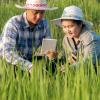
A new policy brief from the EU-funded Crowd4SDG project offers guidelines for National Statistical Offices on how to unleash the potential of citizen science in monitoring progress on the UN Sustainable Development Goals.
In our race to meet the Sustainable Development Goals (SDGs) by 2030, National Statistical Offices (NSOs) and National Statistical Systems (NSSs) are under pressure to keep up with monitoring and disaggregating enormous amounts of data. As a result, in the past five years the perception of official statistics communities has become more open on non-traditional data sources, which could potentially lessen this burden. Despite this, NSOs have not yet taken advantage of non-traditional data sources such as citizen science on a large scale. In fact, a 2021 survey conducted as part of the Crowd4SDG project showed that only around 10% of respondents from NSOs and NSSs had been involved in citizen science projects.
A 2020 IIASA-led study showed that citizen science has the potential to help monitor 76 global SDG indicators, but it has only contributed to five to date. There are also numerous local citizen science initiatives that could be scaled up to produce data for national and global level monitoring. If NSOs adopted the use of non-traditional data sources, it would not only foster further support for citizen science initiatives but would also help provide more timely data on SDGs, with higher levels of granularity, at a lower cost in comparison to traditional data sources such as household surveys.
“This policy brief builds on IIASA research on understanding and realizing the potential of citizen science for SDG monitoring and reporting,” says Dilek Fraisl, contributor of the study and a researcher in the IIASA Advancing Systems Analysis Program, who participated in the research and policy brief. “It provides important recommendations on how to build trusted partnerships around citizen science data, not only to address the data gaps in the SDG framework, but also to build data ecosystems that support inclusive decision making by empowering citizens and communities.”
According to the 2021 Crowd4SDG survey, the main obstacles to the wider adoption of citizen science data by NSOs are issues concerning the lack of awareness about databases, issues with access and legal permissions, and concerns about the quality of data.
To address the problem of awareness and access, the policy brief proposes mapping all citizen science databases relevant for SDG monitoring and fostering progress towards national development priorities. To ensure that the citizen science data quality meets the standards of official data sources, the policy brief advises the application of the UN National Quality Assurance Framework and adds new criteria to this framework, such as impartiality and confidentiality, among others.
“Issues around the quality of citizen science are often raised, particularly if such data are being used for scientific research or decision making. Addressing this, the Quality Assurance Framework outlined in the policy brief represents a way forward in the dialogue between NSOs and citizen science projects,” says Linda See, a senior researcher at the IIASA Advancing Systems Analysis Program, who is also involved in the project.
This Policy Brief shows how NSOs can give value to citizen science data benefitting official statistics, policymaking, and citizen science communities, thereby lessening the burden and costs of monitoring, and helping our progress toward reaching the Sustainable Development Goals.
Click here for the full policy brief
News

03 February 2025
Dr. h.c. Johan Kuylenstierna receives prestigious H.M. The King's Medal

17 January 2025
IICA explores research opportunities with IIASA

05 December 2024

